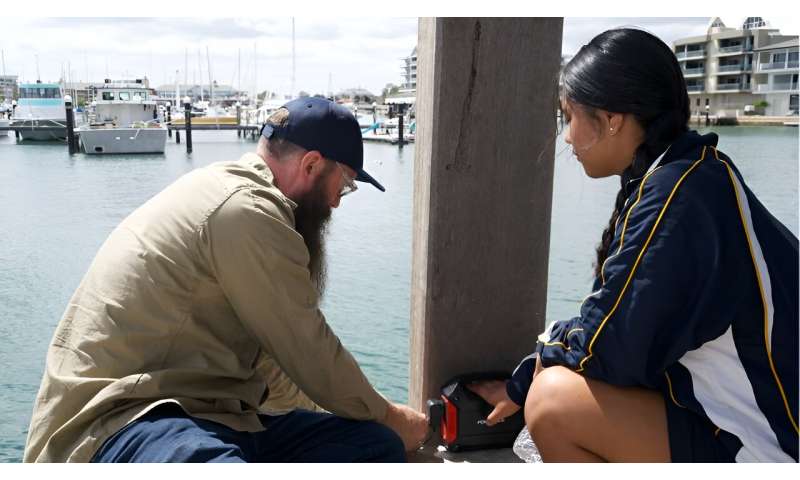Shellfish super-spies to improve aquatic ecosystems

Mussels fitted with sensors will be used to monitor the health of waterways in WA's Peel and Upper South West regions, thanks to a three-year partnership between Murdoch University's Harry Butler Institute and the Alcoa Foundation.
Led by Research Fellow Dr. Alan Cottingham, the project will see three species of mussels used at six monitoring stations across the region.
These include Mandurah Marina, Murray River, Serpentine River, Lane Poole Reserve, Harvey Dam and Waroona Dam.
Cottingham said mussels operate like secret spies, closing at the first sign of stress brought on by water quality issues.
Attaching sensors to the mollusk's shell to indicate when they close will provide an early warning sign for potential problems.
"We are using a 'canary in a coal mine' theory and applying technology to help us identify ecosystem changes that may result in far greater issues such as fish kills and toxic algal blooms," Cottingham said.
"Bindjareb Djilba (the Peel-Harvey Estuary) is the largest and most diverse estuary in the South West. However, the estuary, its rivers and catchments are also among the most impacted by our drying climate and modification by human activity.
"Consequently, fish kills occur most years in the estuary. However, the causes are often unknown."
The water monitoring project aims to understand impacts and causes of fish kills or mass mortality events (MMEs) and discover how to reduce their frequency and severity.
Alcoa Foundation President Caroline Rossignol said the project aligned with a key Foundation objective to invest in projects that contribute to improved outcomes in biodiversity conservation and climate change mitigation and adaptation.
"We are excited to support the Harry Butler Institute on this important project and look forward to learning how the mussel monitoring stations can assist in improving the health of waterways, not just in Western Australia but potentially around the world," Rossignol said.
Cottingham explained the project was particularly important with the region's waterways which contain several critically endangered and vulnerable species and are an important spawning and nursery grounds for recreationally and commercially important fish and crustaceans.
"Not only are MME events distressing for recreational water users and the local community, but they can have broader reaching economic impacts too," Cottingham said.
The South West region is facing some of the most significant declines in streamflow in Australia. Finding ways to support much earlier intervention will be critical to maintain healthy ecosystems.
Over the course of the next three years, six stations will be deployed, with each station linked to school and Aboriginal ranger groups.
The students will be trained to undertake initial assessments when poor water quality events occur and their work will be monitored by the Department of Water and Environment Regulation, a partner in the delivery of this project.
Cottingham added that engaging with local Aboriginal rangers would allow for further understanding of the land and waterways throughout the project, and the students participating from local schools would have the opportunity for hands-on aquatic learning to accompany their schooling.
The project officially launched on October 18 at Mandurah Ocean Marina.
Provided by Murdoch University